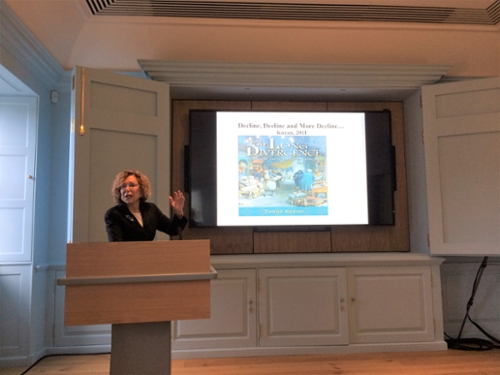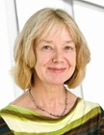Events
Upcoming Lectures, Seminars, and Colloquia
Dr. Melitta Adamson
Graduate Chair, Comparative Literature
Languages and Cultures
Western University
From the Taqwīm al-ṣiḥḥa and Taqwīm al-abdān to the Schachtafelen der Gesuntheyt: A Culinary Journey in Text and Image
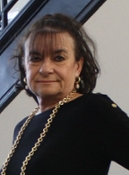 November 23, 2023
November 23, 2023
4:00pm
Lawson Hall 1227
Very little of the rich medieval Arab cuisine made it to Christian Europe. A handful of popular Arab dishes were included in northern Mediterranean cookbooks, and some 82 recipes, extracted from Ibn Jazla’s pharmacopoeia Minhāj al-Bayān, were translated into Latin and German in the late Middle Ages. Perhaps because the dishes listed in Ibn Buṭlān’s Taqwīm al-ṣiḥḥa were left out of the lavishly illustrated European versions of the Tacuinum sanitatis, food historians have so far paid little attention to the Latin and German tabular versions which do include them. Dishes are also mentioned in Ibn Jazla’s Taqwīm al-abdān fī tadbīr al-insān for diseases from head to toe which likewise had a Latin and German reception and was, in fact, combined with Ibn Buṭlān’s Taqwīm in the Schachtafelen der Gesuntheyt. Subject of this study are the dishes mentioned by the two authors in their respective Taqwīm, their role in Arab cookery and dietetics, their translation into Latin in the late thirteenth century, and their introduction to a sixteenth-century German-speaking audience in text and image through the new medium of print. The study is part of a larger chapter which will appear in Steven M. Oberhelman, ed. Manuscripts, Plants, and Remedies of the Ancient and Postclassical Mediterranean World: Cross- and Interdisciplinary Studies. 3 vols. (Berlin and New York: Walter de Gruyter).
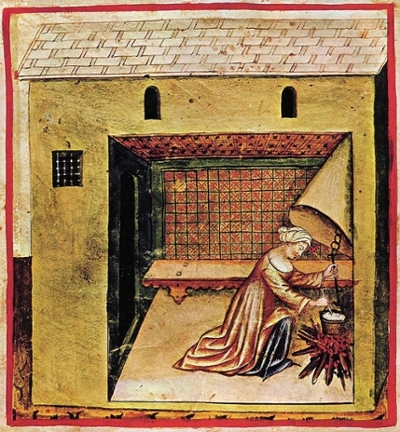
MENARG, the Middle East and North Africa Research Group resume its presentations and discussions of new research projects on the Middle East.
For previous events, click here.
___________________________________________________________________________________________
Winter 2023
Dr. Rachel Forrester - Jones, Professor and Director
School of Health Studies
The economic, social and cultural rights of vulnerable people in the Middle
East and North Africa 
April 4th, 2023
3:30pm
Lawson Hall 2270 C
In this presentation, Dr. Forrester - Jones discussed the economic, social and cultural challenges vulnerable people are currently experiencing in the Middle East and North Africa.
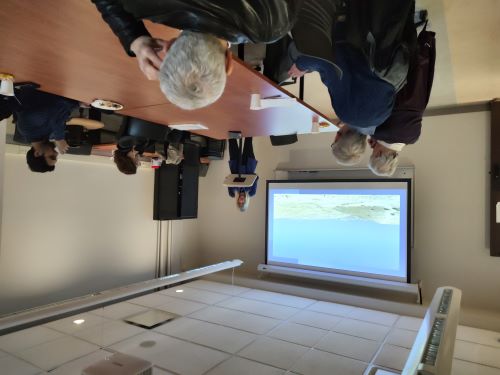
___________________________________________________________________________________________
Dr. Uri Jacob, Postdoctoral Associate
Don wright Faculty of Music
Musical Inscription in the Medieval Eastern Meditteranean: A Cross - Cultural
Perspective 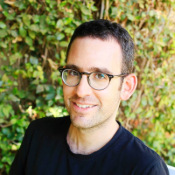
March 16th, 2023
3:30pm
Lawson Hall 2270 C
Notated manuscripts were common among the Latin communities established across the Eastern Mediterranean during the crusader period (1099–1291), as is primarily evidenced by nine large codices notated throughout—most of which are liturgical—and by some dozen more scattered notated items. In addition, there is a fair amount of written, visualized indications of melodic information coming down to us from the Byzantine, Armenian, Muslim, and Jewish communities of this area. This phenomenon challenges the historiographical narrative suggesting that during pre-modern times musical notation and inscription were exclusively used in the West, pointing out the relevance of music to areas such as medieval communication and Eurocentric bias in academia. Furthermore, an analysis of these exceptionally early cases of musical literacy in a non-European setting illuminates a neglected aspect of the cross-cultural exchange among Latins of various regional and lingual backgrounds (French, Italian, German, etc.) who prayed together in the same churches as well as between crusader and local Eastern Mediterranean communities sharing the same urban environments.
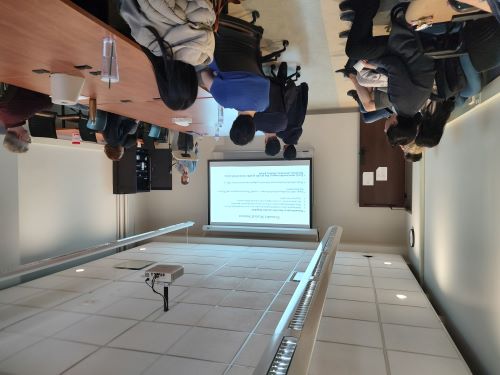
___________________________________________________________________________________________
D. Robin Baker 
Emeritus Professor of Hebrew Bible and Ancient Near Eastern Studies
University of Winchester, UK
Bridges from Babylon:
The Afterlife of Cuneiform Culture in the Pre-Islamic Middle East
February 16th, 2023
3:30pm
Lawson Hall 2270 C
The civilization that emerged in ancient Iraq in the fourth millennium produced the world's earliest known writing system: cuneiform. Originally developed in Sumer, cuneiform culture thrived for 3,000 years, with the latest datable cuneiform tablet written in the first century AD. This culture produced the world's first imperial polity (Assyria), and ancient Babylonian scholars were the first to attempt to classify knowledge empirically and comprehensively. Yet, its impact on other cultures in the Middle East has not received the attention it merits. In this presentation, Robin Baker will discuss knowledge transmission in the region in the pre-Islamic period. He will demonstrate that cuneiform culture played a significant role in the formation and formulation of Judaism and Christianity and in their underpinning epistemologies.
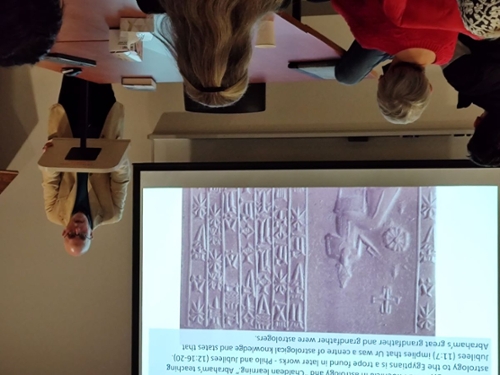
___________________________________________________________________________________________
Fall 2019
 Dr. Maya Shatzmiller
Dr. Maya Shatzmiller
Research Initiative on the Economics of the Middle East
Fourth workshop, Panmure House, Edinburgh
14-15 November 2019
Keynote lecture: Maya Shatzmiller, University of Western Ontario, ‘Structural change and economic development in the Islamic Middle East, 700-1500’
The Programme for the workshop may be accessed through the following link: https://rieme.org/programme/
___________________________________________________________________________________________
Ingrid Hehmeyer
Associate Professor
History of Science and Technology
Ryerson University
The Transmission of Knowledge:
Examples from Classical Arabic Medicine
October 29th, 2019
3:30pm
Lawson Hall 2270 C
In Greek humoralism, the cause of illness is explained as a disturbance of the natural balance of the four bodily humors. This theory formed the unchallenged basis of classical Arabic medicine. Using text examples from one of the most influential books in the history of medicine, Ibn Sīnā’s Canon of Medicine (completed in 1023), we will examine the theoretical framework of the Canon and how it is reflected in recommendations for medical treatment. The translators of the Greek medical texts faced serious difficulties and we will look into how they solved them. The talk will conclude with some medical scenes from Arabic manuscripts that show the challenges involved in the transmission of medical knowledge.

_____________________________________________________________________________________
Professor Mohammad Fadel 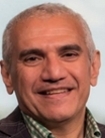
Professor of Law
University of Toronto
Economic Reasoning in Early Islamic Law, Several Cases from the Muwatta
Thursday, Nov. 1, 2018
3:00pm, 1227 Lawson Hall
A look at Muwatta’of Malik b. Anas as evidence for the willingness to use economic reasoning in the law, and the efficiency-enhancing nature of Islamic law.
For Professor’s Fadel’s research project on Malik’s Muwatta’ see
https://islamiclaw.blog/2019/09/20/recent-scholarship-fadel-and-monette-on-the-english-translation-of-the-muwatta-of-imam-malik-b-anas/ and https://papers.ssrn.com/sol3/papers.cfm?abstract_id=3411857
___________________________________________________________________________________________
Dr. Feyzi Baban 
Associate Professor, Department of Political Studies
Trent University
Can Turkish Democracy Survive the Rule of the AKP?
Wednesday, April 11, 2018
4PM Room 2270C Lawson Hall
Feyzi Baban is working on two SSHRC funded five year research projects. The first project investigates why, how and under what conditions some communities in various European countries are more open to cultural difference than others; what types of projects facilitate openness to newcomers and how do citizens and non-citizens participate in these projects in ways that transform understandings of citizenship and belonging. The second project studies humanitarian assistance to Syrian refugees and rights claims emerging from legal, political and economic precarious conditions Syrian refugees face in Turkey.
___________________________________________________________________________________________

Sara Khorshid
PhD candidate in History
University of Western Ontario
Egypt Post the Arab Spring: Political Developments Since 2011
Tuesday, October 24, 2017
1:30pm Room 1227 Lawson Hall
A look at how the political situation in Egypt has evolved since the 2011 Uprising, and why what started as a revolutionary triumph for democratization has spiraled into a tense political situation and an unprecedented crackdown on dissidents
___________________________________________________________________________________________
Dr. Zheger Hassan 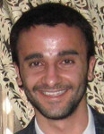
Adjunct Professor of Political Science
King's University College at the University of Western Ontario
The Kurdish State in the Middle East: a New Power Broker
Tuesday, January 31, 2017
3:30-5:00 Room 2270C Lawson Hall
The talk by Professor Hassan discussed the factors that provided the opening for the emergence of Iraqi Kurdistan as an important player in the politics of Iraq and the Middle East. It explained that the presence of ISIS in Iraq and Syria provided Iraqi Kurdistan with opening to become a strategic actor in the Middle East. Specifically, the fight against ISIS propelled regional and international actors to enter into a political and military alliance with Iraqi Kurdistan. This furnished the Kurds with unprecedented influence and leverage in Iraq and the broader Middle East.
Dr. Hassan published an op- ed in the Globe and Mail – July 7, 2017
___________________________________________________________________________________________ 
Dr. Maya Shatzmiller
Department of History
University of Western Ontario
WHY IS IT SO HARD TO MAKE SENSE OF THE MIDDLE EAST TODAY?
REFLECTIONS OF AN HISTORIAN
Friday, March 11, 2016
18th Annual Graduate Student Conference
The talk addressed the recent developments in the Middle East and reflected on them in light of the two research projects I am conducting: “Women in Islamic Law.”, and “Structural change and economic development in the medieval Middle East.” The research projects may be accessed through the following link: https://www.medievalislamiceconomy.uwo.ca
___________________________________________________________________________________________ 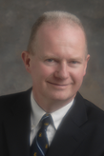
Dr. Vivian McAlister
Professor, Division of General Surgery
University of Western Ontario
RE-ESTABLISHING POST GRADUATE MEDICAL EDUCATION IN AFGHANISTAN
Tuesday, January 26, 2016
3:30-5:00 Room 2270C Lawson Hall
The signature weapon in recent conflicts in the Middle East is the Improvised Explosive Device (IED). When it is directed against individuals it is known as the anti-personnel IED. Dr McAlister and his colleagues cataloged injuries caused by this device. They demonstrated how the injuries are much worse than those seen with conventional anti-personnel landmines, against which the Ottawa Treaty was designed. McAlister and colleagues report that was published in the British Medical Journal demonstrates that use of the Anti-personnel IED might be a war crime.
About Dr McAlister:
Dr McAlister is a general surgeon, at University Hospital London, with special interest in hepatobiliary, endobiliary, transplant and combat surgery. He is the Angus D. McLachlin Professor of Surgery at the University of Western Ontario. He was a regular force member of the Royal Canadian Medical Service, Canadian Armed Forces, (rank Lieutenant Colonel) and has deployed overseas many times. His research interests include fundamental and clinical research in these areas as well as their history. He has been president of the Canadian Society of Transplantation and the Canadian Organ Replacement Registry . Dr McAlister was a member of council of the Royal College of Physicians and Surgeons of Canada and was chair of Region Advisory Committee (RAC) 3 (Ontario and Nunavut) of the Royal College. As editor-in-chief, he increased the Impact Factor of the Canadian Journal of Surgery fivefold. Dr McAlister was awarded the John McCrae Memorial Medal by the Canadian Medical Association and the Lifetime Achievement Award by the Canadian Association of Transplantation in 2019.
___________________________________________________________________________________________
Dr. Tarek Loubani
Assistant Professor, Department of Medicine
University of Western Ontario
Consultant physician, Division of Emergency Medicine
London Health Sciences Centre
HEALTH CARE IN GAZA, PAST AND PRESENT
Tuesday, January 19, 2016
3:30-5:00 Room 2270C Lawson Hall
The health situation in Gaza has experienced a sharp deterioration in the past decade. In this talk, Dr. Tarek Loubani examines the rising health needs and the impact of the blockade and several wars on the ability of Gaza's health system to cope. Dr. Loubani is an emergency physician working in London, Ontario and volunteering in the Gaza Strip's Al-Shifa hospital.


